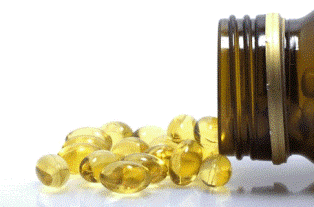August 21st, 2010 by JenniferKearneyStrouse in Better Health Network, Health Tips, News, Research
Tags: ACP Internist, American Journal of Obstetrics & Gynecology, Diet and Nutrition, Dietary Supplement, Dietetics, Early-Onset Preeclampsia, Food and Nutrition, Healthy Pregnancy, Nutrients, Pregnancy and Childbirth, Pregnant Women, Reuters Health, Vitamin D
No Comments »

 A new study in the American Journal of Obstetrics & Gynecology reports that low levels of vitamin D may be linked to early-onset preeclampsia in pregnant women.
A new study in the American Journal of Obstetrics & Gynecology reports that low levels of vitamin D may be linked to early-onset preeclampsia in pregnant women.
The trial found that the average vitamin D level in 50 pregnant women with preeclampsia was 18 ng/mL, compared with 32 ng/mL in 100 women with healthy pregnancies. No casual relationship was proven, and the study’s lead author told Reuters Health that the recommended vitamin D intake in pregnant women hasn’t changed, but the study results raise yet more questions about this much-discussed nutrient.
ACP Internist covered the pros and cons of vitamin D in its November 2009 issue. (Reuters, ACP Internist)
*This blog post was originally published at ACP Internist*
August 20th, 2010 by Steven Roy Daviss, M.D. in Better Health Network, Health Policy, Humor, News, Opinion, Research, True Stories
Tags: Addiction Medicine, Controlled Substances, Drug Abuse, Drug Control, Herbal Incense, Home Chemists, Homemade Soap, JWH-018, K2, Medical Humor, Methamphetamine, Pharmaceuticals, Poison Control, Pseudoephedrine, Red Devil Lye, Research Labs, Spice, Substance Abuse, Substance Manufacturing, Synthetic Cannabinoid
No Comments »



By ClinkShrink
There’s always something new, even in the world of substance abuse. Lately I’ve been reading a lot in the media about K2, a synthetic cannabinoid that’s being sold (and outlawed) in many states. It’s commonly mixed with herbal incense and smoked. Nicknamed “spice,” it was originally created by scientists and called JWH-018.
Apparently some states’ poison control centers have been getting calls about it due to the physical symptoms it can cause, specifically palpitations and GI problems. The part of the story that I thought was interesting was the fact that originally only 250 milligrams of the stuff was created, in an “official” research lab, but that home chemists quickly took up the experiment and it’s now a part of our national drug culture. Read more »
*This blog post was originally published at Shrink Rap*
August 20th, 2010 by BarbaraFicarraRN in Better Health Network, Health Tips, Research
Tags: American Heart Association, Beth Israel Deaconess Medical Center, Cardiac Fitness, Cardiology, Couch Potato, Diabetes Prevention, Dr. Ernest Gervino, Family Medicine, Fitness and Exercise, General Medicine, Heart Disease, Heart Health, HeartMail, High Blood Pressure, High Cholesterol, Hypertension, Internal Medicine, Lack Of Exercise, Little Or No Exercise, Moderate Exercise, Peripheral Artery Disease, Physical Exercise, Primary Care, Regular Exercise, Risks of Physical Inactivity, Sedentary Behavior, Sedentary Lifestyle, Stroke
No Comments »

 We’ve all made the excuses: You can’t face the drive to the gym, you’re too tired at night, getting up in the morning is a chore, or it’s too hot or cold outside. So you cozy up on the couch in front of the television. If you’re a couch potato, you’re a gambler — with your life.
We’ve all made the excuses: You can’t face the drive to the gym, you’re too tired at night, getting up in the morning is a chore, or it’s too hot or cold outside. So you cozy up on the couch in front of the television. If you’re a couch potato, you’re a gambler — with your life.
Unfortunately you’ll need a big sofa because you’re not the only one whose heart isn’t in physical activity. About 60 percent of adults in the U.S. are not getting the exercise they need, according to a report from the U.S. Surgeon General.
It’s time to get up and face — or better yet, dance to — the music! Here are a few facts that may get you moving for your heart’s sake. Read more »
*This blog post was originally published at Health in 30*
August 19th, 2010 by Debra Gordon in Better Health Network, Health Policy, News, Opinion, Research
Tags: Accelerated Approval, Avastin, Bevacizumab, Breast Cancer, Cancer Drug, Cancer Research, Cancer Survival Rates, Cancer Trials, Clinical Trials, Conditional Drug Approval, Drug Approval Revoked, Drug Risk Factors, FDA, Food and Drug Administration, Healthcare reform, Metastatic Cancer, Oncology, Progressive-Free Survival, Revoking A Drug, Targeted Monoclonal Antibody, Tumor Angiogenesis, Tumor Drug
No Comments »

Time to get back up on my soap box.
Next month the FDA is supposed to consider taking the unique, first-time-ever step of revoking a drug’s indication not because it’s dangerous, but because it doesn’t work well enough to offset its risks. Never mind that it costs about $8,000 a month.
The drug is Avastin (bevacizumab), a targeted monoclonal antibody that prevents tumors from creating and maintaining their own blood supply, a process called angiogenesis. Without oxygen and nutrients from blood, tumors can’t keep growing.
Avastin is the world’s best-selling cancer drug, approved for use with chemotherapy to treat lung cancer and metastatic colorectal and breast cancer. It is also being investigated (and, likely, being prescribed off label) for numerous other cancers. The problem comes with breast cancer. Read more »
*This blog post was originally published at A Medical Writer's Musings on Medicine, Health Care, and the Writing Life*
August 19th, 2010 by Lucy Hornstein, M.D. in Better Health Network, Opinion, Quackery Exposed, Research
Tags: Acupuncture, CAM, Complementary And Alternative Medicine, Conventional Medicine, Evidence Based Medicine, Harriet Hall, Holocaust Denial, Medical Quackery, New England Journal of Medicine, Science Based Medicine, Science Denialists, Selective Science Denialism, Steve Novella, TCM, Traditional Chinese Medicine
3 Comments »

Statement #1:
The holocaust never happened. Hitler loved Jews and respected Jewish culture. The photographic evidence of the camps, including the bodies and atrocities, were all fakes designed by the State of Israel to generate international sympathy.
Statement #2:
Traditional Chinese medicine (TCM) is an effective treatment for numerous medical conditions. Acupuncture has been around for centuries and is widely practiced in China and elsewhere. Science has proven its efficacy in controlled experiments.
With any luck, that first statement should generate dozens of hits from watchdog groups berating me for spreading the vile lie of Holocaust denial.
The second statement, or words perilously close to that effect, has appeared in the New England Journal of Medicine, a previously-prestigious medical publication now revealed to be no better than the National Enquirer or any other sleazy tabloid, fit only for lining bird cages and wrapping week-old fish. Thanks to this wonderful article by Harriet Hall, it turns out that the first reference to “needling” in Chinese medical literature is from 90 B.C., although it doesn’t refer to acupuncture. It’s talking about lancing abscesses and bloodletting. The technology required to make sufficiently thin needles didn’t even exist until 400 years ago.The Chinese government tried to ban acupuncture several times around the turn of the twentieth century. The actual term “Traditional Chinese Medicine” was coined by Mao Tse Dung in the 1960s! (Go read Hall’s article linked above. It’s awesome.)
So riddle me this, campers: Why (and how) do science denialists get away with these outrageous lies? Read more »
*This blog post was originally published at Musings of a Dinosaur*
 A new study in the American Journal of Obstetrics & Gynecology reports that low levels of vitamin D may be linked to early-onset preeclampsia in pregnant women.
A new study in the American Journal of Obstetrics & Gynecology reports that low levels of vitamin D may be linked to early-onset preeclampsia in pregnant women.





 We’ve all made the excuses: You can’t face the drive to the gym, you’re too tired at night, getting up in the morning is a chore, or it’s too hot or cold outside. So you cozy up on the couch in front of the television. If you’re a couch potato, you’re a gambler — with your life.
We’ve all made the excuses: You can’t face the drive to the gym, you’re too tired at night, getting up in the morning is a chore, or it’s too hot or cold outside. So you cozy up on the couch in front of the television. If you’re a couch potato, you’re a gambler — with your life.









